10 Most Inspiring Film Quotes
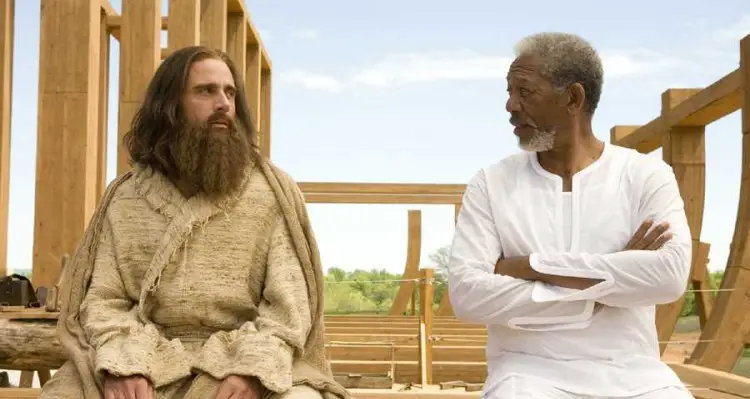
Chilean. Living in Buenos Aires. Currently on book #4. Melomaniac,…
There is a certain point where our love of literature meets our love of cinema. It happens when a screenplay is so well-written, so insightful, that we can quote from it as we would from any well-respected book. Words that make us think, ponder the world around us, criticize the society we live in, analyze the direction our lives are headed towards, or simply inspire us to take action.
But of course, it is not enough to quote a magnificent line from a certain film; what’s equally important is the context in which the line was uttered – the back story – the riveting performance given by the actor or actors involved. Below is my list of the ten most inspiring quotes in cinema history.
10. “Here’s looking at you, Kid.” — Rick Blaine, Casablanca (1942)

Set in Morocco in 1941, Casablanca has everything a grand film could want: a lush setting in the midst of danger (Moroccan Casablanca under Vichy rule), an interrupted love story, shady characters, anti-heroes, a treasure (the transit letters Rick has in his power) and ultimately, self-sacrifice – a final, unforgettable scene where Rick, exhorts Ilsa, the love of his life, to flee Casablanca alongside her husband Victor, forgetting all about him and their promise to be together. You see, Rick understands that only with Ilsa by his side can Victor continue his work for the Czech resistance. And the resistance is more important than whatever love story Rick and Ilsa may have.
“Here’s looking at you” is a toast. A thing two friends or lovers say to each other when they share a drink, as they will both see each other through the glass when empty. Rick uses the line to make Ilsa feel better about their separation. It is an ad-libbed celebration of sorts, a celebration because ultimately, no matter the cost of their sacrifice, good will triumph over evil. It is the kind of quote that made the women of the time weep and the men want to be Rick Blaine (men even took up smoking as an American national pastime – how to forget the cigarette eternally dangling from Bogey’s lips?). It is the kind of quote that calls for altruism, and interestingly, while not being an actively pro-WWII-involvement film, it certainly waved the flag for America’s entry into the war.
This is why it is such an unforgettable line, and so absolutely inspiring. For whenever faced with a deed that involves more resolve or sacrifice than we can think of bearing, “Here’s looking at you, Kid” reminds us that every tough instance in life that we get through is cause for celebration.
And of course, let’s not forget the timeless chic of Humphrey Bogart and Ingrid Bergman in trench coats.
9. “You are at your very best when things are worst.”— Starman, Starman (1984)

The conversation reads:
Mark Shermin: Have people from your world been here before?
Starman: Before yes. We are interested in your species.
Mark Shermin: You mean you’re some kind of anthropologist? Is that what you’re doing here? Just checking us out?
Starman: You are a strange species. Not like any other. And you’d be surprised how many there are. Intelligent but savage. Shall I tell you what I find beautiful about you? [Shermin nods] You are at your very best when things are worst.
—Starman – 1984
Starman is one of those gems of the 1980’s that has sadly gone unnoticed by the recent generations. It is one of John Carpenter’s best films. So good in fact, Jeff Bridges was nominated for an Academy Award for Best Actor, a feat no other Carpenter movie has achieved. The score by Jack Nietzche, —Phil Spector’s close collaborator who’d later go on to work with The Rolling Stones— is perfect: haunting and otherworldly. Both Karen Allen and Bridges achieve notable performances; their tenderness so poignant that it just leaps off the screen at you. A scene never to be forgotten takes place on a night train and I will just matter-of-factly call it one of the sweetest, most touching interactions between two people (well, one of them human, at least) ever captured on film – Ever.
As the Starman struggles to make haste and meet his alien rendezvous, a matter of life or death as the earth’s atmosphere is slowly killing him, Charles Martin Smith (Shermin) catches up with the wanted couple. Shermin is a government official who is torn between his duty and the Starman’s well-being. When he asks the Starman about his experience with Earth, the alien tells him that he actually finds beauty in the human race: a sense of courage in the face of adversity, Shermin is sold. He has nothing left to do but help the Starman escape the Feds and head to his final meeting point, showing that he too, is at his best when things are worst. Ultimately, Shermin allows us to believe in mankind again.
A beautiful film that shouldn’t be forgotten and one of Jeff Bridges‘ finest performances.
8. “But I, being poor, have only my dreams. I have spread my dreams under your feet. Tread softly because you tread on my dreams. I assume you dream, Preston.’ — Partridge, Equilibrium (2002)
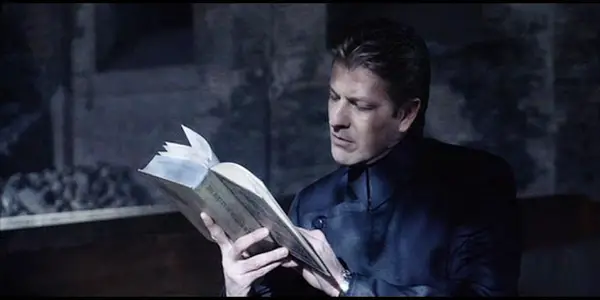
It certainly isn’t A Brave, New World —the title of one of the sci-fi books on which Equilibrium was based— it’s more of a sad, apathetic one. Thanks to a drug called Prozium, the inhabitants of Libria are spaced-out, unfeeling zombies just going through the motions of their day-to-day. An unemotional mass is so much easier to control than one filled with rage, love, or courage.
Partridge is a cleric of this New World Order, a man committed to destroying any piece of art, literature, film or any kind of object that would trigger emotion. The Mona Lisa? Burned in one of the opening scenes. A bottle of perfume? A crime against Libria. A gilded mirror frame? That could very well get you incarcerated, and then killed.
But who knows how many books Partridge has taken with him at these burnings? Or how many doses of Prozium he’s willingly skipped? We see him reading the poetry of Yeats, calmly sitting in one of the forbidden zones. When his partner, the tyrannical, dutiful, ever suspicious Preston finds him, Partridge knows his time has come. But before he goes, he quotes Yeats, “Tread softly because you tread on my dreams.” “Does Preston dream?” he asks. Perhaps there is an inkling of the transformation that will occur in Preston, but not yet. For now, all Patridge knows with certainty is that he, Partridge, is a man who dreams. A man who’d rather die than live without beauty, without feeling in his life and ultimately he sacrifices himself to this dream of freedom.
Partridge’s sacrifice is what makes his declamation a beautiful, quotable thing (and of course, whatever Sean Bean chooses to do on film, he does it with great aplomb and credibility. And don’t get me started on Yeats).
7. “Neo, sooner or later you’re going to realize just as I did that there’s a difference between knowing the path and walking the path.” — Morpheus, The Matrix (1999)
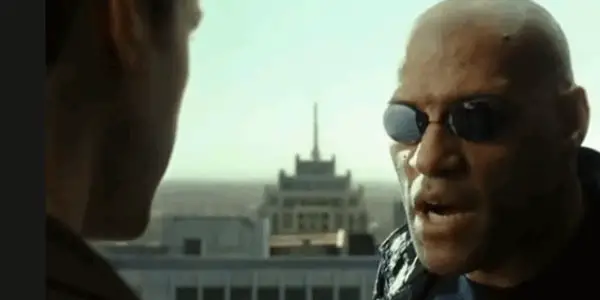
1999’s The Matrix forever changed our collective unconscious, quietly imbibing itself into every sci-fi movie made since its release. It is a one-of-a-kind hero’s journey, but a hero’s journey nonetheless, complete with self-doubt, love of mentor, the gradual realization of one’s potential, and new spiritual highs and/or salvation/transformation.
So is Neo the One or isn’t he? The tech-age Messiah who knows the truth and will use that truth to set mankind free? The Matrix is, if nothing more, a fantastic re-imagining of the New-Testament narrative. Morpheus, the mentor, a John the Baptist to Neo’s Messiah, believes Neo is the one. And we´re invested in his ‘deity’ since the opening credits; so when after an unbelievable helicopter and glass building sequence, Morpheus asks Trinity if she believes; it is just a matter of stating what we know the movie is leading to. We believe – sure we do. As does Trinity… but there’s still the matter of Neo – his lack of faith in himself and the Oracle’s prophecy about Morpheus’ (the mentor) possible death. All this of little consequence to Morpheus, for when he tells Neo that there is a difference between knowing the path and walking it, he’s saying that nothing worthwhile was ever accomplished by letting fear keep us captive. It is only when Neo lets go of his fear that he is able to come into his own as the One.
And this is perhaps, The Matrix’s greatest spiritual lesson: embrace the fear and keep walking.
6. “But you know happiness can be found even in the darkest of times, when one only remembers to turn on the light.”— Albus Dumbledore, Harry Potter and the Prisoner of Azkaban (2004)
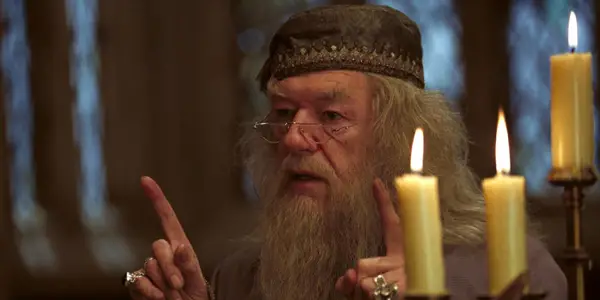
In Harry Potter and the Prisoner of Azkaban, it is a time of turmoil at Hogwarts. Dementors are stationed at every door trying to find the escaped convict, Sirius Black. They are ghastly creatures, more of a void than an actual living being. They feed off human joy, inducing despair and depression when they’re out and about. Their most vicious act is sucking the psyche of those they “kiss” until nothing is left but a vegetable. Dumbledore, concerned about the welfare of his students, cautions them against meddling with the Dementors, adding, almost as an afterthought, that “happiness can be found even in the darkest of times, when one only remembers to turn on the light.”
The sage Dumbledore could have perfectly left his warning at that, but knowing the impressionable minds of his young students, he also leaves them with a lesson: no matter how desperate the situation seems (and being in the presence of a Dementor will make anyone desperate), the mind can always find a semblance of joy to hold onto; joy and hope that will carry them forward, preserving their spirit until the battle is won. It is an idea much in the spirit of Holocaust survivor Victor Frankl, who said, “When we are no longer able to change a situation, we are challenged to change ourselves.”
Indeed, these are words that we could very well use, that are necessary even, in an era where most voices call us to despair: violence, wars, hunger, crime, mass media manipulation. We must try to rise above it all with a mental attitude that focuses on the good, the noble and the upworthy; knowing that in order to soar above darkness, we must first face the challenge of finding the light.
5. “If someone prays for patience, do you think God gives them patience, or does He give them the opportunity to be patient? If they pray for courage, does God give them courage, or does He give them opportunities to be courageous?” — Morgan Freeman, Evan Almighty (2007)
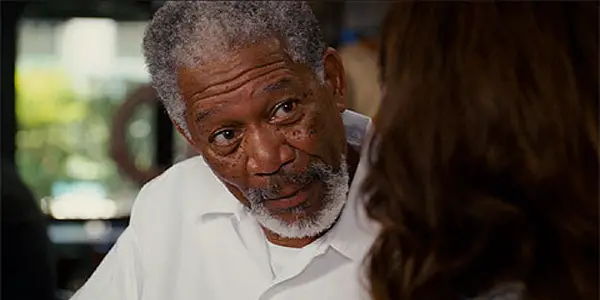
If God were to take on human form, I cannot think of anyone better than Morgan Freeman to house the Almighty. I often wonder if it is ever lost on viewers that just as the son of God was born into poverty and boasted no worldly possessions, meaningful titles, or any one-up paraphernalia while alive —hanging out with the outcast and those dwelling on the fringes of society; so Hollywood’s portrayal of God in the form of Morgan Freeman is a step in the right direction. Evan Almighty’s God is not a white, anglo-saxon male a la 1977’s with George Burns playing a likeable God, but one stuck within the confines of the political correctness of the times. Surely, an African American God in 1977 would have raised more than a few eyebrows; but times have changed (thank God). And yes, why not believe that if God felt like interacting with his creation, he’d most certainly do it in the guise of an African American just to kick the American establishment in its behind. And really, what is there not to like about Morgan Freeman? The voice, the kind eyes, the warm humor? I just want the man to hug me and tell me it will all be alright, already.
That said, the film is not a great piece of cinema per se. Perhaps not even “good;” certainly not as witty or as comedic as the first Bruce Almighty film. But the above quote alone makes the entire film worth watching.
We come across a forlorn Lauren Graham sitting at a diner, convinced her husband has lost his marbles, when along comes Freeman in the guise of a waiter (the name tag humorously reads “Almighty”) and comforts her using one of the loveliest pieces of dialogue to grace the silver screen. He asks her to see this conundrum as an opportunity through which to grow in love, courage, and family; reminding us that we when we pray, we expect to be given the object of our prayer, without considering that the answer is many times given in the form of an opportunity.
A beautiful reminder.
4. “How happy is the blameless vestal’s lot!
The world forgetting, by the world forgot.
Eternal sunshine of the spotless mind!
Each pray’r accepted, and each wish resign’d.”— Mary, Eternal Sunshine of the Spotless Mind (2004)
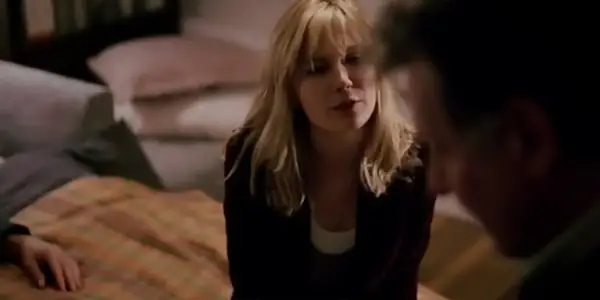
The above lines are from a poem by Alexander Pope: Eloisa to Abelard, 1717 —based on the true medieval story of Héloïse d’Argenteuil. In his poem, Pope recounts the tragedy of the lovers, the secret affair between Eloisa and her famous Philosopher tutor, Abelard; an affair that gets Eloisa pregnant (though Abelard would later marry her). Eloisa’s family can never quite give up their rage over the whole thing (even with a marriage certificate in place) so one evening, they break into Abelard’s room and castrate him. With no future ahead of them, Abelard enters a monastery and bids Eloisa do the same. While Abelard’s faith is fast and firm, Eloisa’s is pretense, all she can think about is Abelard, and the dream taken from her. Years later, they would exchange four letters, exploring their tragedy and the nature of love.
Kirsten Dunst quotes these lines as Pope intended; the quote brilliantly fitting the nature of Dr. Mierzwiak’s business. Eloisa, not able to reconcile her feelings for Abelard and all she has endured, not able to keep the purity of emotion demanded of her by her current occupation of nun, dreams of how blissful her life would be as a woman (a vestal virgin) unspoiled, unburdened by her memories of love. This is, in essence, what Dr. Mierzwiak tries to achieve in his patients, the removal of emotional suffering through forgetting. It is a thoughtful use of Pope’s poetry and it gives us something to ponder. If we could, what would we choose to forget?
Interestingly, this isn’t the first time Charlie Kaufmann quotes Pope’s Eloisa and Abelard in his films. He had previously also incorporated Pope’s poem into Being John Malkovich.
3. “So, your professor wore a three-piece suit and blamed you for your jeans. And your jeans were “too much.” And he didn’t understand that his suit was also a costume. You thought your jeans stood for love, freedom and sexual equality; we at least know that we’re in costume.” — Margaret, Liquid Sky (1982)
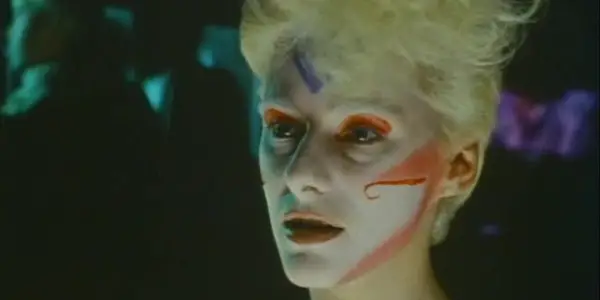
An alien the size of plates lands on a rooftop, while punk/new wavers dance their hearts out at a new wave club. Then we are given the perspective of the shapeless aliens as they peer into a rooftop apartment with decor Andy Warhol would have loved. Believe me when I say that the alien POV is worth the movie alone. And let’s not forget that the film’s soundtrack uses the Fairlight CMI, the first digital sampling synthesizer in history, making us squirm with the foreboding notes of its bizarre opening tune.
So begins Liquid Sky, a gem of independent filmmaking and a statement of counterculture life in the 1980’s. Truly a child of its time, the film comes across as a fable for the consumerist, egotistical, disenchanted, and disenfranchised American mainstream culture (and its resulting counterculture) under the newly-formed Reagan administration.
Part satire, part fable, feminist manifesto with plenty of sci-fi thrown in, a dash of Punk, and a good dose of the New Wave aesthetic, Liquid Sky becomes a living work of art. The passage of time treats it kindly, making it glamorous in a retro-kitsch way. And yes, it’s also profound, fascinating even, with dialogue that feels like a shot of despair straight to your brain. A testament to the frenzied, selfish, instant-gratification environment of the 1980’s.
When Margaret (a brilliant Anne Carlisle) delivers the quote above, we can feel the anguish of her generation. She is neither an innocent flower child, nor an anarchic punk, she is part of the ’80’s New Wave, Post-Punk generation, and she knows thateverything about the society she lives in is contrived; just another bite of what corporate America is feeding them. Yet her words are a premonition of what is to come: grand ideologies, grand gestures and our very raison d’être dying on a massive scale, leaving nothing but disposable culture in its wake. A world that becomes increasingly hard to navigate.
Whatever the case, the end product is a film so fascinating in its weirdness (and wow is it weird), so solid in its message, that you just cannot look away. It’s the type of film that will stay with you, for better or for worse. I like to think it’s for better, because the kind of silent disenchantment Margaret has with the current state of affairs is also a call to action. Ultimately it is up to the newer generations to improve what the older ones have wrecked.
2. “Even the most miserable life is better than a sheltered existence in an organized society where everything is calculated and perfected.”— Steiner, La Dolce Vita (1960)
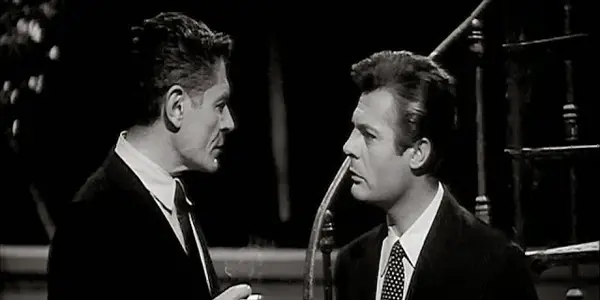
La Dolce Vita is one of those films that changes with your viewings. The first time you see it, it will mean one thing; the second time you see it, perhaps several years apart, it may mean another. The third time, for me at least, it meant coming to face with the fact that there is no such thing as the “Sweet Life.” There is only life, and a bittersweet one at that. There is also this: the emptiness that haunts all men and women who have lost their center.
La Dolce Vita is the ongoing quest of a man to find himself (and his center) amidst what and whom he considers to be the sweetness of life: celebrities, beautiful people, or sometimes just people in dream-scape scenarios that carry him from one dawn to the next: another party, other folk, yet another experience. Marcello, the film’s lead, consumes experiences like one would his or her drug of choice; never fulfilled, one goes on to the next fix, hoping that this time the thirst will be quenched.
But Marcello remains the eternal empty vessel, for experiences and people outside of himself can never fill, can never give us peace or bring us to our center. And the only sensible person in this journey, the person he admires and wants to emulate, Steiner (a man filled with aplomb, wisdom, and self-confidence, a mentor of sorts) turns out to be nothing more than a broken man behind a mask, just like all the other masks he’s met along the way. Marcello should have known better; there was always a certain stillness behind Steiner’s eyes that spoke of abjection. Yet Steiner’s words ring as true then as they do now —we do live sheltered lives in a society that constrains us, brainwashes us in order to maintain its own survival. Steiner wants Marcello to wake up, something he likes to think that he, Steiner, has achieved. But he is proved shockingly wrong.
La Dolce Vita is as powerful, as grand as life itself. In it, all the hues and nuances of humanity, a roller-coaster ride, a warning even, to find wholeness not in what we see, what or whom we have, not in the eternal greed of he who consumes and consumes, but somewhere else. Where? The film does not answer it for us, but the question is asked beautifully.
Marcello Mastroianni gives life to his namesake and an ensemble cast fuel this timeless classic; in my humble view, the best film to have ever graced the silver screen.
1. “You’re two wonderful people who happened to fall in love and happen to have a pigmentation problem.” —Matt Drayton, Guess Who’s Coming to Dinner (1967)

Though it may seem inconceivable that fifty years ago a couple would be shocked at the thought of their lovely young daughter wanting to marry a “negro” (the term used in the film). Furthermore, that the debate on whether this type of marriage was feasible would span an entire film, discrimination in all forms and walks of life was an American reality until the Civil Rights Act of 1964. This is why Guess Who’s Coming to Dinner was groundbreaking for its time. Released only three years after the Act, it depicts the possibility of two people of different races falling in love and making a life together in this New America, the America of the 1960’s. Going even a step further, it is a vanguard discourse on the very possibilities the educated African Americans had in the New America. Where precisely do they fit in? Can they live without their skin tone being any hindrance to their dreams and aspirations?
Ultimately, the film reminds us that we are, in fact, so much more than our skin tone; that everyone is a person with the right to love and wed whomever they please. That America should make room for its African American children in whatever walk of life they chose to engage. This is why Matt Drayton’s line is monumentally important, it is delivered when he’s finally convinced both John Preston and his daughter, Joey, have a chance at making their mixed-marriage work, putting aside all his prior reservations. Guess Who’s Coming to Dinner is an ode not only to a very specific time in American history, but also to what happens when sensible minds meet over family love and acceptance.
And it is still relevant today, where culture wars and racial discrimination are still rampant in several parts of the United States.
Brilliant performances (and I mean brilliant) by Spencer Tracy, Katherine Hepburn, and Sidney Poitier plus the rest of the cast, only add to the timelessness of this fine film.
My personal choices for the ten most inspiring movie quotes of all time – words that go beyond a screenplay, ideas that linger in our collective unconscious, enriching it. Such is the power of good literature and celluloid.
What about you? Are there any film quotes that have impressed you?
(top image source: Evan Almighty – Universal Pictures)
Does content like this matter to you?
Become a Member and support film journalism. Unlock access to all of Film Inquiry`s great articles. Join a community of like-minded readers who are passionate about cinema - get access to our private members Network, give back to independent filmmakers, and more.
Chilean. Living in Buenos Aires. Currently on book #4. Melomaniac, cinephile, books, & tea. Premature gray hair. Likes succinct by-lines as you can see, but in real-life, she can talk her way into and out of most anything.












